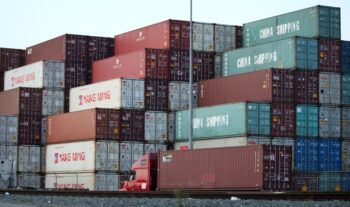How U.S. Imports From China Hurt U.S. And Mexican Workers

China’s growth over the past decades has profoundly influenced global trade. Several recent studies document how U.S. imports from China adversely affect U.S. workers.
These studies suggest that Chinese imports are associated with lower wages and employment. What has been less appreciated, however, is that U.S. imports from China also adversely affect Mexican workers. This finding is important because it indicates that the United States and Mexico face common challenges that, through cooperation, they could successfully face together. You can read about it in “How US Imports from China Affect Mexican Labor Markets.”
The author, Raymond Robertson, is the director of the Mosbacher Institute for Trade, Economics, and Public Policy and a professor of economics and government at the Bush School of Government and Public Service at Texas A&M University. He studies international and labor economics.
The Takeaway is a publication of the Mosbacher Institute at the Bush School of Government and Public Service.
Media contact: Raymond Robertson, 651-295-0827, robertson@tamu.edu.





